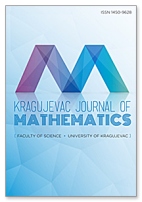On the Zeros of Apolar Polynomials
 Download PDF
Download PDF
Authors: I. NAZIR, M. I. MIR AND I. A. WANI
DOI: 10.46793/KgJMat2504.653N
Abstract:
The classical notion of apolarity is defined for two complex polynomials of same degree. The main property of two apolar polynomials, f(z) and g(z) was given by Grace’s theorem which states that “every circular domain containing all the zeros of f(z) contains at least one zero of g(z) and vice-versa”. A. Aziz [?] dropped the condition that f(z) and g(z) are of the same degree in case the circular domain is a disk. In this paper, we extend the result of A. Aziz to every kind of circular domain and hence an extension of Grace’s theorem for two arbitrary polynomials is proved. This also allows us to generalise the results of Walsh, Szego, Takagi, Aziz and several other results about apolar polynomials.
Keywords:
Polynomial, apolar, zeros, circular domain.
References:
[1] Q. I. Rahman and G. Schmeisser, Analytic Theory of Polynomials, Oxford University Press, Oxford, 2002.
[2] T. Sheil-Small, Complex Polynomials, Cambridge University Press, Cambridge, 2002.
[3] G. Szego, Bemerkungen zu einem Satz von J. H. Grace uber die Wurzeln algebraischer Gleichungen, Math. Z. 13 (1922), 28–55.
[4] T. Takagi, Note on algebraic equations, Proc. Phys-Math. Soc. Japan 3 (1921), 175–179.
[5] J. L. Walsh, On the location of roots of certain types of polynomials, Trans. Amer. Math. Soc. 24 (1922), 163–180.
